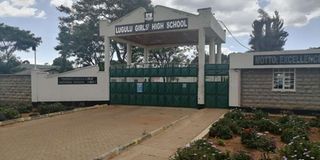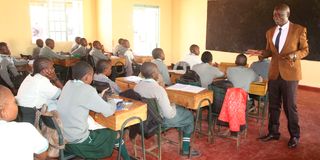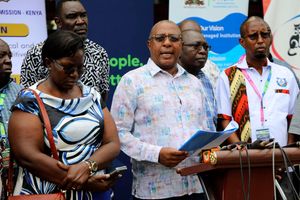
Lugulu Girls High School in Bungoma County.
The Ministry of Education has revised the categorisation of secondary schools that will transition into senior schools starting January 2026.
This has been done based on the institution’s ability to offer various career pathways and subject combinations under the competency-based education (CBE) system.
The ministry has abolished the traditional classifications—national, extra-county, county and sub-county and introduced a new four-cluster model.
Each cluster outlines the career pathways and subject combinations available at the respective schools. The updated clusters are available on the Ministry of Education’s website: https://selection.education.go.ke <https://selection.education.go.ke/>.
Under the new system, all former national schools now fall under Cluster 1, extra-county schools are in Cluster 2, county schools in Cluster 3 and Sub-county schools in Cluster 4.

Kakamega Primary School and Junior Secondary School Grade 9 learners during a lesson on January 6, 2025. Learners are expected to pick their senior schools before undertaking the Kenya Junior School Education Assessment in November.
This restructuring follows recommendations by the Presidential Working Party on Education Reforms in its 2023 report.
The career pathways offered under CBE include Science, Technology, Engineering and Mathematics (STEM), Social Sciences and Arts and Sports Science.
Superior infrastructure
Cluster 1 schools will offer all three pathways due to their superior infrastructure.
The remaining clusters are required to offer at least two pathways, with STEM being mandatory. Schools with adequate facilities and staffing may offer all three.
Additionally, schools are categorised by accommodation type (day or boarding) and gender.
Learners and their parents can view this information, including school locations, on the ministry’s website.
For instance, Kangaru School in Embu County will offer all three pathways.
Under STEM, it has 14 subject combinations available, nine for Social Sciences, and 10 for Arts and Sports Science. Each combination consists of three subjects.
According to the Basic Education Curriculum Framework, 60 percent of learners in senior school will be placed in the STEM pathway, 25 percent in Social Sciences, and 15 percent in Arts and Sports Science.
Education Cabinet Secretary Julius Ogamba assured parents and stakeholders of the integrity of the placement system being used by the 1.2 million Grade 9 learners currently selecting their preferred senior schools and career pathways.

Junior secondary school learners are taken through a science lesson inside a lab at Bomu Primary School in Changamwe, Mombasa County, in January this year.
“The Grade Nine candidates are using the system to make their senior school choices based on career pathways, gender, school type, and location, among other factors. Preparation for the Grade Nine national assessment is progressing well and results will be released in time to ensure smooth placement,” said the CS during the Kenya Secondary Schools Heads Association conference in Mombasa.
The CS also announced the reversal of an earlier directive to create day wings in national boarding schools. Principals had opposed the directive citing potential discipline issues.
Adequate funds
He noted that once the 8-4-4 system is fully phased out, senior schools will no longer be congested as they will consist of only three grades—Grades 10, 11, and 12.
“Senior schools will now have an extra classroom(s) left by the fact that we will only be having three grades at this level. These classrooms are expected to provide extra space for every senior school, enabling us to avoid overcrowding,” said the CS.
Mr Ogamba further assured that the Kenya Institute of Curriculum Development (KICD) will distribute all necessary learning materials for Grade 10 before the transition and that the Teachers Service Commission (TSC) has been allocated adequate funds to retool all senior school teachers.
He urged teachers to maintain a zero-tolerance policy on examination and assessment of malpractices.
“Education is not just about access; it's about quality. I urge every headteacher to institutionalise school-based assessments, data-driven improvement plans and mentorship programs for both learners and teachers,” he said.
On rising cases of indiscipline, student unrest, and drug abuse, Mr Ogamba said the ministry is developing a national strategy on school safety and learner well-being.

Education Cabinet Secretary Julius Ogamba (left) and National Chairman, Kenya Secondary Schools Heads Association Willy Kuria during the 48thKESSHA Annual National Conference for in Mombasa on June 25, 2025.
He also reaffirmed the government’s commitment to sustaining the Free Day Secondary Education (FDSE) programme which has faced recent funding delays.
“For the second term, the government has disbursed Sh22 billion in capitation for basic education, including Sh11.6 billion for FDSE. We are working with the National Treasury to ensure timely release of all allocated funds,” he said.
Mr Ogamba called on educators to practice transparency, accountability, and prudent financial management in line with the Public Finance Management Act, 2012.
"Every shilling must be accounted for. You are entrusted not only with the care of children but also with public resources. Ensure compliance with all circulars, including the prohibition of unauthorised levies unless approved by the ministry," he added.









